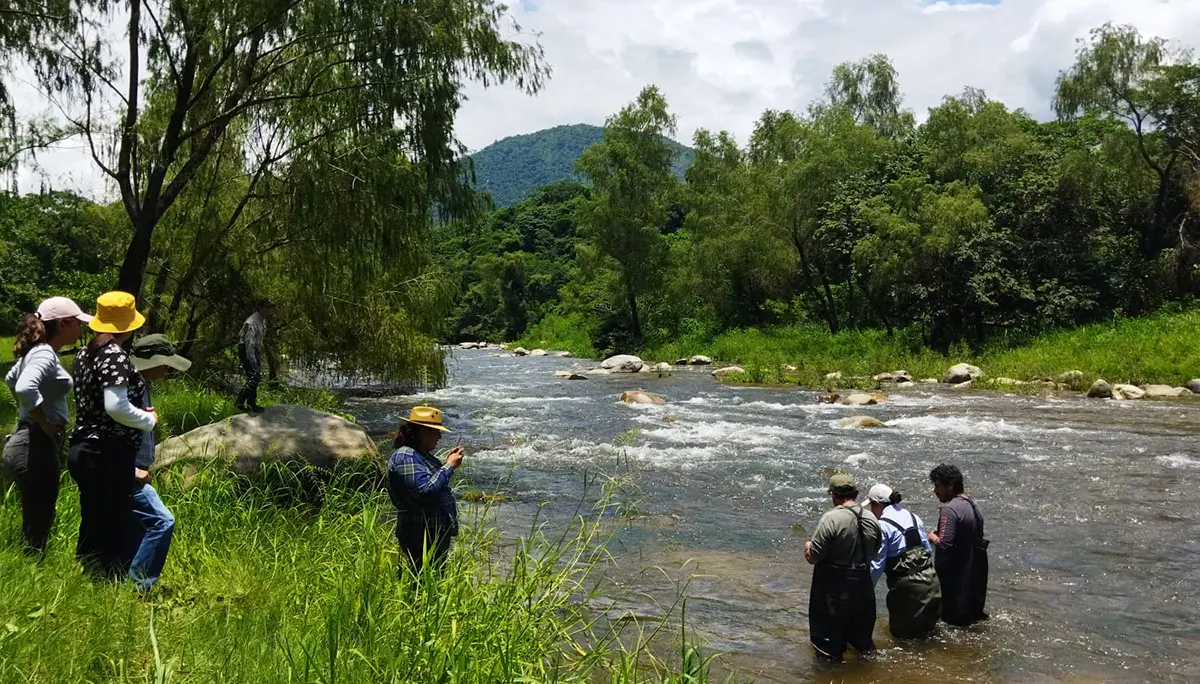Innovation Network for Adaptation to Extreme Weather Events in Urban Environments in Chiapas
Organization: Fondo de Conservación El Triunfo, A.C.
Mission: We are a nonprofit organization with over 20 years of uninterrupted work promoting ecosystem conservation and sustainable development in communities of southeastern Mexico.
Location: Arriaga, Pijijiapan, and Mapastepec, Chiapas
Communities benefiting directly from the project: Arriaga, Pijijiapan, Mapastepec, Emiliano Zapata, Novillero, Valdivia, Coapa, and Cintalapa.
Country: Mexico
Other Organizations Involved: Agence française de développement: Funding for riverbank restoration through the Bioconnect project, which includes technical assistance and covers the operating costs of restoration. Ministry of the Environment and Natural History (Secretaría de Medio Ambiente e Historia Natural) of Chiapas: Partnered with the Conservation Fund (Foncet) to provide native plants for riverbank restoration and for implementation of pollinator gardens; will also build capacity for germplasm production among local actors. Ministry of Civil Protection (Secretaría de Protección Civil) of the Chiapas state government: Will provide inputs for the local extreme weather response protocol in urban areas.
 @ Dr. Salcedo
@ Dr. Salcedo
Background
The coastal municipalities of the Sierra Madre de Chiapas, including Arriaga, Tonalá, Pijijiapan, Mapastepec, Acapetahua, Escuintla, Villacomaltitlán, Huehuetán, Motozintla, Mazatán, Cacahoatán, and Tapachula, in the State of Chiapas, Mexico, are highly vulnerable to extreme weather phenomena, including intense droughts and torrential rainfall.
In the last two decades, flooding and heat waves have negatively affected the quality of life of the urban populations of these municipalities. For example, a record high temperature of 45°C has been recorded in Pijijiapan, and rainfall has caused rivers to overflow their banks, sediment to build up on the banks, and contamination to occur as a result of deforestation in the mountains in which the rivers running through these urban áreas find their source.
Society-level action is crucial to confronting these challenges. Therefore, the project aims to implement a territorial network of innovation that will create the social structures necessary to implement nature-based solutions to these climate-related challenges in vulnerable urban areas of the coastal region and the Sierra Madre de Chiapas.
Goals
- Training of 90 changemakers.
- Restoration of 10.1 km of riverbanks.
- Operationalization of three climate change innovation centers (CICC).
- Three pollinator/vegetable gardens implemented at the CICCs.
- Database with contingency support network.
- A climate change contingency operational protocol.
Main activities
- Creating a network of changemakers.
- Building technical, gender, and communication capacity for the people to be trained as changemakers in order to facilitate implementation of the nature-based adaptation measures.
- Establishment of three climate change innovation centers (CICC) in the municipalities of Arriaga, Pijijiapan, and Mapastepec, offering climate change adaptation teaching and innovation models in urban areas, with technologies for riverbank restoration, riverbed maintenance, and flood mitigation; water management functions provided by urban parks; community gardens, and flood risk management.
Expected outcomes
- By year-and 2025, 90 changemakers will have been trained to adopt and promote nature-based climate change adaptation, with resulting benefits for 1200 residents of urban areas vulnerable to extreme weather events in the coastal region and the Sierra Madre de Chiapas.
- Three climate change innovation centers (CICC) will be in operation, with their respective pollinator and enriched vegetable gardens.
- A total of 10.1 km of riverbank will have been restored in the municipalities of Arriaga, Mapastepec, and Pijijiapan.
- By 2026, 1200 residents of the three municipalities will have been trained in extreme weather response techniques.